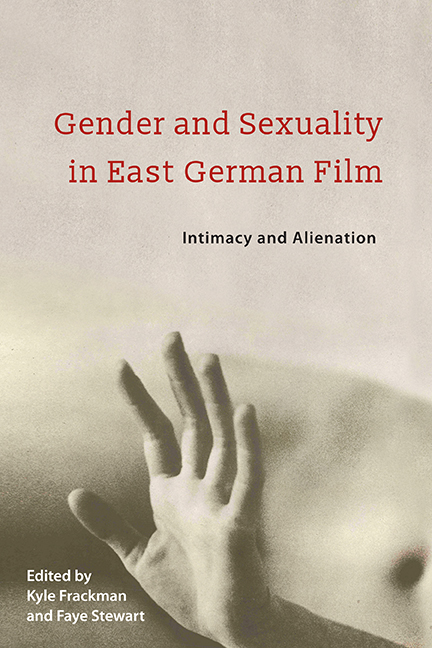Book contents
- Frontmatter
- Contents
- Acknowledgments
- List of Abbreviations
- Introduction: Sex and Socialism in East German Cinema
- 1 Hypnagogic Mothers: Gender, Amateur Film Labor, and the Transmissive Materiality of the Maternal Body
- 2 Powerless Heroines: Gender and Agency in DEFA Films of the 1960s and 1970s
- 3 Jutta Hoffmann and the Dialectics of Happiness: A Socialist Star in Close-Up
- 4 Who Is the “Third”? Homosociality and Queer Desire in Der Dritte
- 5 Volatile Intimacies and Queer Polyamory in GDR Film
- 6 Interracial Romance, Taboo, and Desire in the Eastern Counter-Western Blutsbrüder
- 7 The Desire to Be Desired? Solo Sunny as Socialist Woman's Film
- 8 Ambivalent Sexism: Gender, Space, Nation, and Renunciation in Unser kurzes Leben
- 9 Dealing with Cancer, Dealing with Love: Gender, Relationships, and the GDR Medical System in Lothar Warneke's Die Beunruhigung
- 10 Reimagining Woman: The Early Shorts of Helke Misselwitz
- 11 Shame and Love: East German Homosexuality Goes to the Movies
- 12 Gendered Spectacle: The Liberated Gaze in the DEFA Film Der Strass
- Notes on the Contributors
- Index
4 - Who Is the “Third”? Homosociality and Queer Desire in Der Dritte
Published online by Cambridge University Press: 16 May 2018
- Frontmatter
- Contents
- Acknowledgments
- List of Abbreviations
- Introduction: Sex and Socialism in East German Cinema
- 1 Hypnagogic Mothers: Gender, Amateur Film Labor, and the Transmissive Materiality of the Maternal Body
- 2 Powerless Heroines: Gender and Agency in DEFA Films of the 1960s and 1970s
- 3 Jutta Hoffmann and the Dialectics of Happiness: A Socialist Star in Close-Up
- 4 Who Is the “Third”? Homosociality and Queer Desire in Der Dritte
- 5 Volatile Intimacies and Queer Polyamory in GDR Film
- 6 Interracial Romance, Taboo, and Desire in the Eastern Counter-Western Blutsbrüder
- 7 The Desire to Be Desired? Solo Sunny as Socialist Woman's Film
- 8 Ambivalent Sexism: Gender, Space, Nation, and Renunciation in Unser kurzes Leben
- 9 Dealing with Cancer, Dealing with Love: Gender, Relationships, and the GDR Medical System in Lothar Warneke's Die Beunruhigung
- 10 Reimagining Woman: The Early Shorts of Helke Misselwitz
- 11 Shame and Love: East German Homosexuality Goes to the Movies
- 12 Gendered Spectacle: The Liberated Gaze in the DEFA Film Der Strass
- Notes on the Contributors
- Index
Summary
THE 1972 FILM Der Dritte (The Third; released in English as Her Third, 2006), directed by Egon Gunther, was one of the greatest cinematic sensations of the GDR. Der Dritte earned domestic and international praise for its sympathetic portrayal of a lonely, twice-divorced working mother who pursues the man who will become her third husband. Like the contemporary blockbuster Die Legende von Paul und Paula (The Legend of Paul and Paula, 1973, dir. Heiner Carow), Der Dritte delighted audiences by emphasizing romance, intimacy, and personal fulfillment over ideology and morality. Brought to life with humor and through Jutta Hoffmann's talent in the starring role, Der Dritte's depictions of women's romantic, familial, and sexual lives resonated with viewers far beyond the borders of the GDR, who applauded its progressive treatment of a single female professional raising two children by different fathers. Gunther's protagonist, mathematician Margit Flieser, embodies the distinctive rhythms of women's emancipation in the public and private spheres: like many East German women, she has access to education and technical training, opportunities for career advancement, and the respect of her coworkers, but Margit must contend with inconsistencies between her professional empowerment and the enduring norms of feminine submissiveness and domesticity in romance and marriage. Margit bucks social expectations by actively pursuing her next lover and dictating the timeline of their courtship as well as the role that he will play in her family life.
Beneath Der Dritte's heteronormative surface, hints of queer longing attest to the emerging yet limited visibility of same-sex love in East Germany in the 1970s. Director Gunther's depiction of romance and intimacy, based on screenwriter Gunther Rucker's adaptation of Eberhard Panitz's 1969 novel Unter den Bäumen regnet es zweimal (Under the Trees It Rains Twice), invites queer readings of Margit's sexuality and of her relationship with colleague and confidante Lucie (played by Barbara Dittus). The polysemic term “queer” lends itself fittingly to a study of Gunther's figures because—by contrast with “lesbian” or “bisexual”—it suggests the ambiguity and fluidity of desires that come to expression in his film.
- Type
- Chapter
- Information
- Gender and Sexuality in East German FilmIntimacy and Alienation, pp. 84 - 103Publisher: Boydell & BrewerPrint publication year: 2018
- 1
- Cited by



